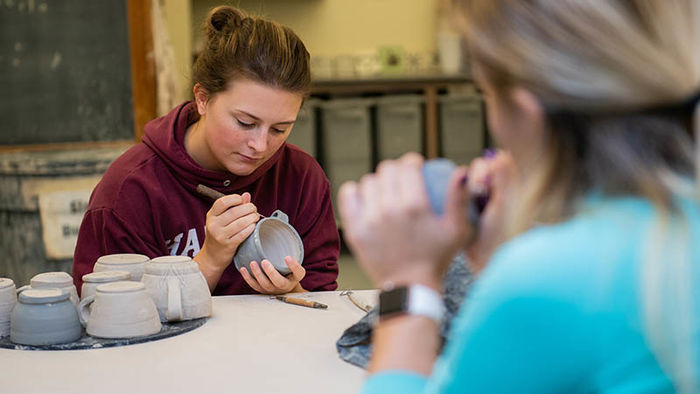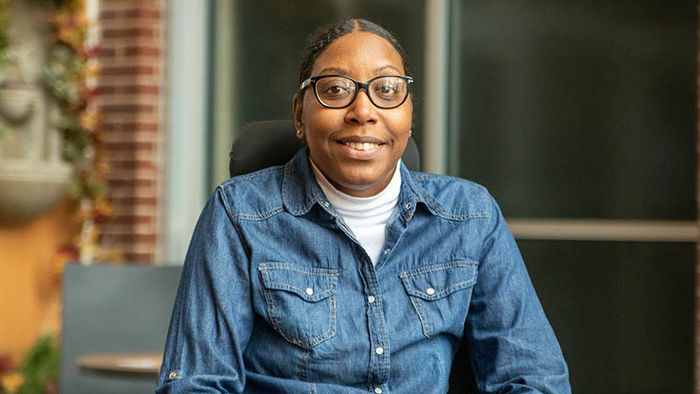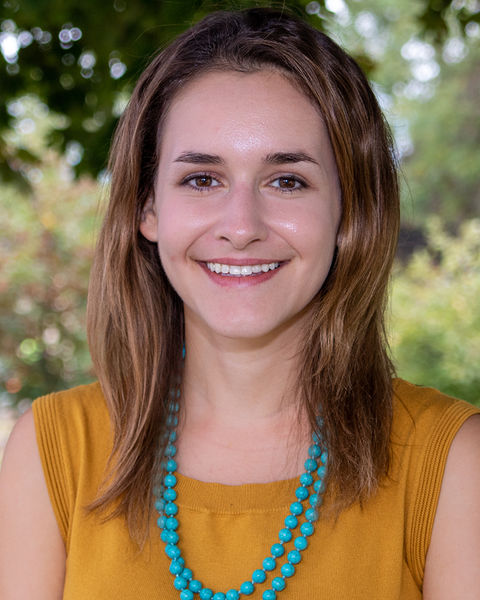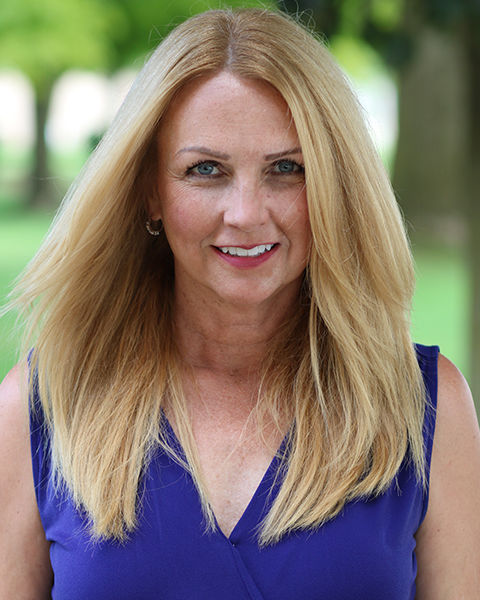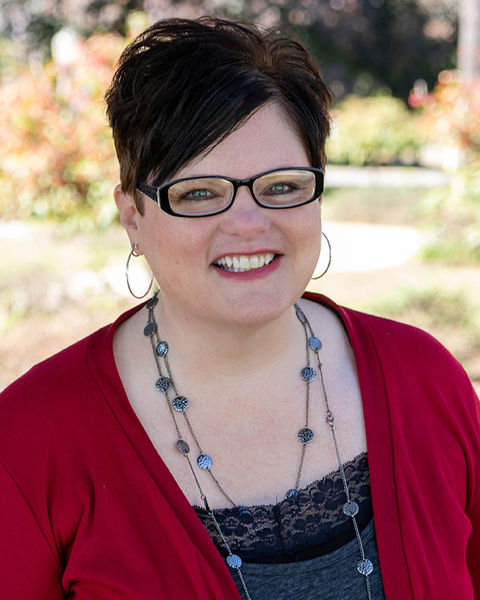Secure a career in the rapidly growing human services field
Join Penn State’s only program that emphasizes human development that is approached from the fields of psychology, biology, and sociology.
Our Human Development and Family Studies major will prepare you for professional, managerial, and scientific roles in health and human service professions.
Quickly expanding, the social worker field is expected to grow at a rate of 12% - now’s the time for you to prepare for the anticipated demand!
Options
Human Development and Family Science
This option provides students with the knowledge and skillsets to work with children, youth, and adults in community settings.
Developmental Science for Health Professions
Students will gain an understanding of developmental science and biology as a foundation to pursue a career in health-related professions and graduate studies.
Penn State Shenango offers two Human Development and Family Studies program opportunities:
- The Human Development and Family Studies major concentrates on developing and conducting human services across the lifespan. You will explore the biological, psychological, and the sociological facets of life in order to help community members live healthy, successful lives.
- In addition to earning a degree in Human Development and Family Studies, you have the additional option to concentrate your studies in family life education. Penn State Shenango’s accredited program allows graduates to apply, in an abbreviated process, for the National Council on Family Relations’ Certified Family Life Educator credential.
Visit Penn State Shenango
Check out our selection of open houses, application workshops, and personalized visits to discover why Penn State Shenango is the perfect place for you.
You’ll love the Human Development and Family Studies major if…
- You have always been curious about human behavior and family relationships, and how people relate to one another
- You are passionate about pursuing a career in which you develop, implement, or evaluate interventions designed to improve the lives of individuals and families
- You want to be prepared for industry demands of social workers and counselors
- You plan to pursue one of the many careers in which an understanding of individual and family development across the lifespan would be useful (e.g., counseling, education, health professions, business, policy/advocacy)
- You are interested in studying how psychology, sociology, and biology relate to human development
- You plan to pursue a graduate or professional degree and wish to establish foundational knowledge of the complexity of individual and family development across the life span
Human Development and Family Studies career opportunities
Students who complete this program are prepared to assume leadership roles in a wide range of human service and health professions, including developing new models to prevent and treat social and mental health problems and advocate for new social policies and programs. Jobs in human development across the lifespan are available at federal, state, local, and private organizations.
Social services manager or public welfare officer
In this role, you will coordinate and supervise health service programs and organizations that support community well-being by providing resources like affordable shelter, food, and employment opportunities.
Health program developer or health service educator
These professionals work in a variety of settings to manage day-to-day operation of a program that is designed to improve the physical state of participants. This position requires strong knowledge of specific health topics.
Substance abuse counselor
Serve as a support system for people with drug and alcohol problems, eating disorders, or other behavioral issues. You will teach individuals how to modify their behavior with the intention of full recovery. Because clients are susceptible to relapses, many substance abuse counselors work with clients on an on-going basis.
Mental health services coordinator
Serve as a liaison to community agencies and other agencies providing mental health supports and coordinate collaborative activities for mental health awareness.
Youth services coordinator
Plan, oversee, and direct services and activities to supporting youth education and development. These programs are often sports, education, or counseling related.
Women’s resource manager
Provide safe transitional housing, advocacy, support, information, referrals, and follow-up services to victims of domestic violence, sexual assault, or stalking to persons at risk of domestic violence.
Human resource or employee assistance coordinator
Enhance employee safety and wellness through the organization and maintenance of employee assistance plans.
Public policy social worker
Become a specialized social worker employed by nonprofit organizations and government agencies to enact large-scale social change through legislation, education, and other interventions that are formulated at a policy level.
Continuing your education
Earning your Human Development and Family Studies degree at Penn State can lead to a master's or doctoral degree in the areas of human development, family studies, psychology, sociology, law, behavioral health, nursing, occupational therapy, elementary and secondary education, business, child life, counseling, or social work.
What to expect in the Human Development and Family Studies major
Penn State’s Bachelor of Science in Human Development and Family Studies takes an interdisciplinary approach to help you explore how the biological, psychological, and the sociological facets of life in order to help others live healthy, successful lives.
You will gain a broad background in career skills like counseling, human assessment, program planning and evaluation, and research to become a competitive business professional in the growing human services industry.
Undergraduate research opportunities
Work with faculty experts to learn how to conduct scientific research. Many human development-related careers seek research experience, giving you the chance to gain skills related to the social and behavioral sciences.
Certified Family Life Educator credential
Certified Family Life Educators typically provide information to families through an educational approach, often in a classroom-type setting or through educational materials.
Attainment of the CFLE certification can be embedded within the 4-year HDFS degree and does not require additional classes or semesters, however, it does require careful and specific scheduling of classes with an academic adviser. Learn more about the Certified Family Life Educator concentration.
Campus roots in community health care
Embedding ourselves among the region’s health care experts, our faculty have decades of experience working in hospitals, skilled facilities, and clinics, providing you real-world learnings. Whether your instructor is a medical practitioner, counseling professional, or a business administrator, our degree options ensure that you’re prepared with the technical and soft skills needed to succeed in your career.
Credentials for your interests
Beyond Penn State Shenango’s expanding list 4-year and 2-year degree options, the campus also offers dynamic minor and certificate programs to compliment your major and career goals. Explore our academic programming options.
Start your Penn State story
We're excited you're ready to become a Penn Stater! Now's the perfect time to get started on your application. If you need help getting started, check out our guides to apply for first-year, transfer, or adult students.
Human Development and Family Studies major courses
Review the full Human Development and Family Studies course listing for additional requirements and a sample of the program’s structure.
Adult Development and Aging
Become familiar with changes in physical health, cognition, mental health, social roles, and relationships, and the implications of these changes in adult development and aging that impact disability, dementia, caregiving, and end-of-life decisions.
Infant and Child Development
With a focus on child development theories, this course focuses on children's social interactions, emotional development, cognitive changes, acquisition of language, physiological growth in infancy, and biological changes during the transition from childhood to adolescence.
Family Development
Learn about the social changes that families have undergone throughout time and explore the causes and consequences of these transformations on modern families.
Development and Administration of Human Services Programs
Develop the fundamental knowledge to create and facilitate human services programs in community settings.
Resolving Human Development and Family Problems
Learn the strategies and roles of professional specialists in human development, as well as solutions for human development and family functioning problems.
Gain Human Development experience before you graduate
Our Human Development and Family Studies program is designed for you to complete an internship in your senior year that facilitates the application of your classroom learning in a field setting.
This opportunity is designed to provide students with firsthand experience with both challenges and rewards of the business professional in our local communities, a design that sets the major apart from other human development programs in the region.
Human Development and Family Studies students have completed internships in a variety of businesses and organizations related to:
- Social work, counseling, and psychology
- Teaching and education
- Advocacy and non-profit work
- Business
- Health careers
- Research
- Children, youth, and family services
- Human resources
- Drug and alcohol services
- Higher education
- Corrections
- Behavioral health

